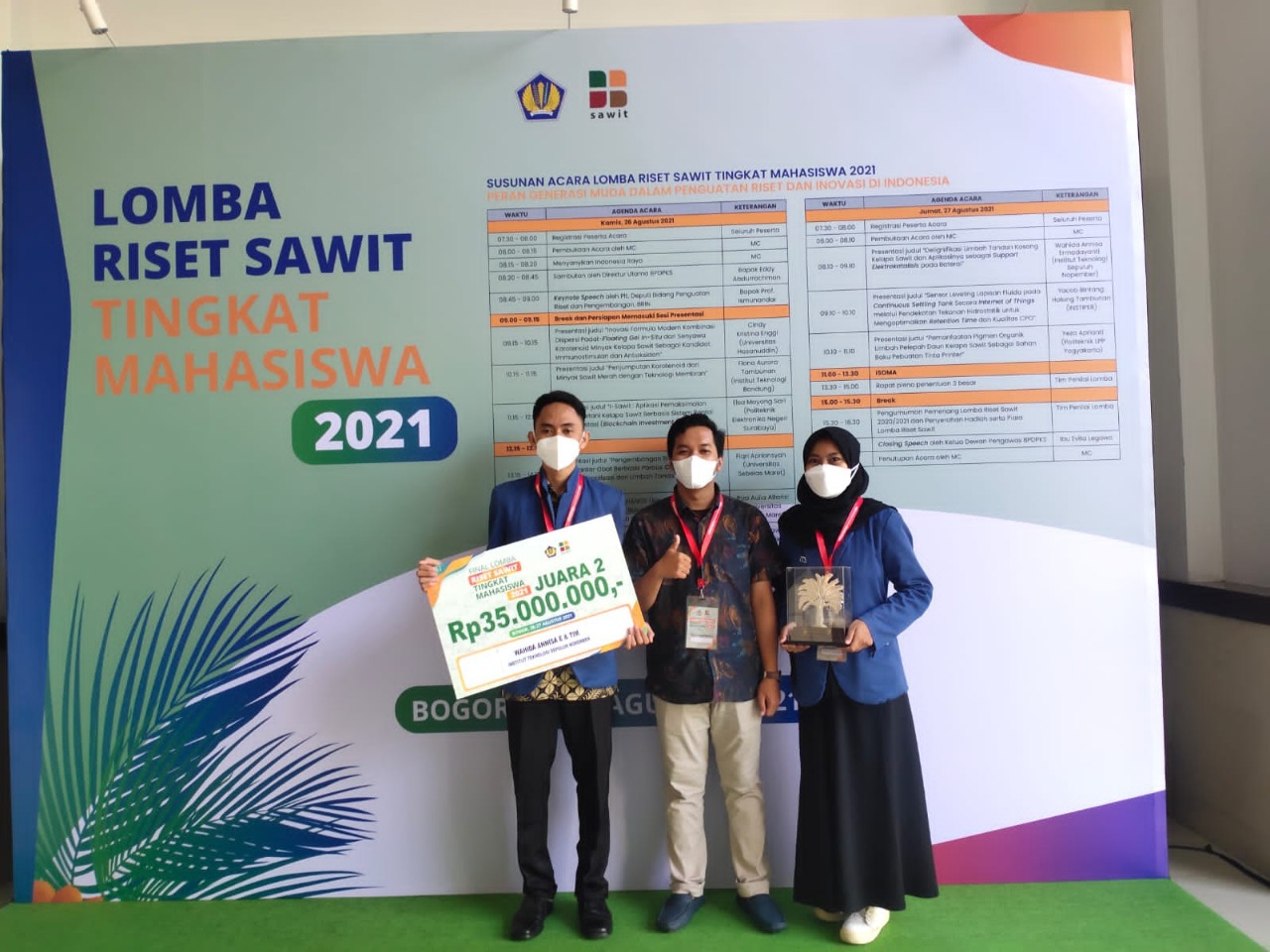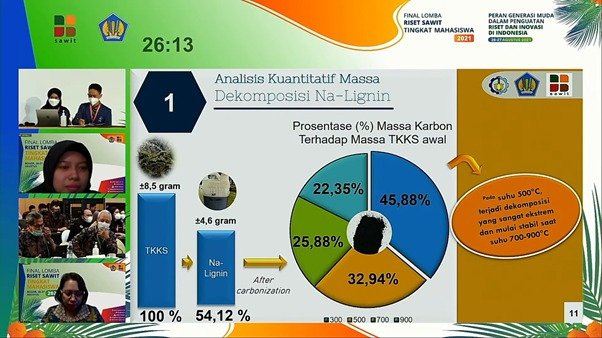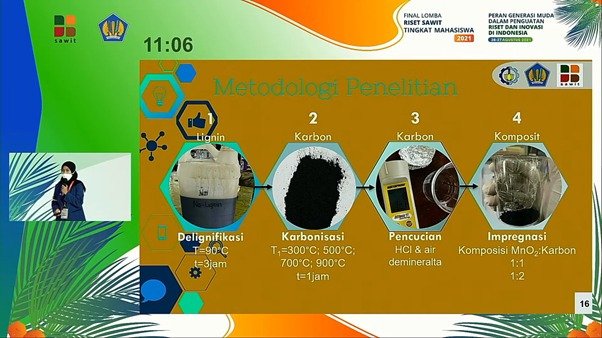Invents Alternative Battery Materials, ITS Students Win Palm Oil Research

The team from ITS Chemistry Department carrying the prize after winning second place in the 2021 Palm Oil Research Competition
ITS Campus, ITS News – Institut Teknologi Sepuluh Nopember yet again carves their achievement nationally. This time, a team from the Department of Chemistry made a brilliant achievement in the 2021 Student Level Palm Oil Research Competition by winning the second place in the final hybrid competition held in Bogor, last Friday (27/8).
The team, led by Wahida Annisa Ermadayanti, consisting of Cinnta Nareswari and Muhammad Salman Al Kahfi, introduced their research using empty oil palm fruit bunches as a support material for electrocatalysis.
According to Wahida, this material is specially made for metal-air batteries, namely a battery that uses oxygen as the cathode and metal as the anode. ” Metal air batteries generally use platinum metal, which has the disadvantage of being limited in availability and expensive,” she explained.
Furthermore, together with her teammates, this Blitar-born student agreed to replace the platinum used in metal-air batteries with manganese dioxide (MnO2). She argues that this material can cover the shortcomings of platinum metal given its more affordable price and has good catalytic properties.
However, she continued, the use of MnO2 also has a drawback, namely its low surface area. “That is why it is necessary to add carbon in the form of reduced Graphene Oxide (rGO) from palm oil empty fruit bunches,” she said.

(from above) Cinnta Nareswari with Muhammad Salman Al Kahfi, Wahida Annisa Ermadayanti, and the jury during the final question and answer session of the 2021 Palm Oil Research Competition
Wahida said that obtaining rGO carbon begins with drying the waste of oil palm empty fruit bunches. Then, the delignification process is carried out to obtain lignin extract from the raw material. This stage continues by synthesizing the obtained lignin into carbon. “Don’t forget to do a characterization test to find out whether the carbon produced is in the form of rGO carbon,” she added.
Because rGO carbon has good conductivity properties, it can conduct electric current as an electrocatalytic support material in batteries. After that, the resulting rGO carbon will be composited with MnO2 to cover the lack of MnO2 and obtain a material with a high surface area and electrocatalytic properties. Finally, said Wahida, the composites obtained will be tested for their electrochemical activity using the cyclic voltammetry (CV) method.
Discussing the advantages of the research conducted by her team, the girl from Surabaya explained that her team’s product was derived from empty oil palm fruit bunches, which are a lot of lignin biomass waste besides coconut shells. Lignin is a waste that is difficult to degrade. So, according to him, the use of empty palm oil fruit bunches waste helps reduce waste that is difficult to degrade and helps create environmentally friendly energy.
Considering that her research is rich in benefits, Wahida and her team hope that in the future, this research can continue to be developed in the form of ready-to-use batteries that have economic value. One of the efforts is to add variations in the ratio of carbon rGO and MnO2 in electrochemical experiments to get the best material ratio applied in metal-air batteries. She also hopes that her research can be tested using the linear sweep voltammetry (LSV) method to know the electron transfer in the sample.

Cininda Nareswari presents the research methodology on the use of unused palm fruit bunches as battery raw material.
In the end, on behalf of her team, this 2017 student expressed her gratitude to her supervisors, Ir Endang Purwanti Setyaningsih MT and Randy Yusuf Kurniawan, who had provided a lot of input and assistance. She also advised ITS students to actively channel their ideas by participating in oil palm research competitions in the coming year.
The Oil Palm Research Competition itself is a competition that is held regularly every two years by the Palm Oil Plantation Fund Management Agency (BPDPKS). Not only at the student level, but lecturers are also given space to develop in the competition. (nadh/ITS Public Relations)
Reporter: Zanubiya Arifah
Related News
-
Proudly, ITS Academic Staff Achieves PAPTI Award 2024
ITS Campus, ITS News — Not only lecturers and students but also the academic staff (in Indonesian: Tenaga Kependidikan)
September 01, 2021 20:09 -
Supports Marine Sustainability, Pertamina Goes to Campus Presents at ITS
ITS Campus, ITS News — Institut Teknologi Sepuluh Nopember (ITS) became one of the partners of Pertamina Goes to
September 01, 2021 20:09 -
Anticipating Lost Pet Dogs, ITS Students Invent a Tracking Bag
ITS Campus, ITS News —Losing a pet is a sad thing for its owners. To anticipate this, a team
September 01, 2021 20:09 -
ITS Students Integrate Smart City Service Features Through Visionaries
ITS Campus, ITS News — Institut Teknologi Sepuluh Nopember (ITS) continues to prove itself as a home for talented
September 01, 2021 20:09
